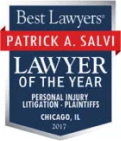National Nursing Week
Transcription.
Interviewer: Did you know this week is National Nursing Home Week? But a lot of times loved ones don’t know how to choose the right nursing care centers. So, joining us this morning is Tara Devine who is a partner at Salvi, Schostok & Pritchard P.C. Thanks for coming and joining us this morning. I have to ask you first of all, Terra, how does a law firm help you decide how to pick the right nursing home? How does that work?
Tara: So we’re aware that there is a lot of information available to the public online, and so a lot of times we’ll get calls from family members who are concerned about something’s that has happened to one of their loved ones. And so we’re able to give them some guidance about how to best choose a nursing home. Before even taking a tour of a nursing home, before even talking to the director of nursing or the administrators, the Illinois Department of Public Health, medicare.gov, they have a ton of information available online which will allow you to compare one nursing home to another one.
Interviewer: Really? So it’s a kinda like a Better Business Bureau of nursing homes to get that information?
Tara: Absolutely. They have quality ratings, they have statistics, data, what they’ve been cited for, what violations have been found, so there’s a lot of information that’s available out there so that you can select the right nursing home for your loved one.
Interviewer: And, you know, that is such an overwhelming decision to begin with, to have to make that decision that it’s time to put someone you love in a nursing home.
Tara: It is.
Interviewer: So you gotta deal with that first and then everybody always feels guilt.
Tara: Of course.
Interviewer: So you wanna make sure you go about doing it right and you just mentioned those two websites that are very important. But let’s talk about nursing homes and how many cases go unreported and how you can make sure you don’t miss out on that.
Tara: Absolutely. So I always tell our clients, “You know your loved one, your mom, your dad, your grandma, your grandpa, better than anyone. And so if you suspect something, you go in and there’s a significant, you know, a significant mental or physical change in your loved one, you should have some reason to suspect that maybe something has happened.”
Interviewer: So give me an example of what you’re talking about, a physical or mental change
Tara: Absolutely. So if you go in and your mom or your grandma is usually typically walking or able to get to a wheelchair, and that morning you go in, you visit your loved one, and they’re complaining of pain or they don’t wanna get out of bed, you might have reason to suspect that maybe there was fall or something that transpired when you weren’t there at the nursing home. And so it’s small things like that and also big things like that that can lead a loved one to suspect that something’s happened.
Interviewer: So are there any red flags that you really should look for if you have any concerns at all? Because I think sometimes, you know, we talk about what I just mentioned was…which is, you have all that guilt. So then you start questioning yourself like, “Okay. Maybe this is because I’m feeling guilty that I’m thinking something’s not right.” So are there any red flags?
Tara: I mean, the red flags would be listen to your loved one. It’s a very vulnerable patient population and they have a hard time accurately describing what transpired or what happened. And that’s why a lot of this goes unreported. So what I would say is, ask your loved one, ask your grandma, your grandpa, you know, “How was everything yesterday? How was your meal last night,” you know, “did anything happen?” So you definitely have to be vigilant, but I would say just keep your ears open and your eyes open and listen to your family.
Interviewer: So if you would say what one of the biggest issues might be in nursing homes so that people can kinda be aware what to look for, what would that be? As an attorney, you guys deal with a lot of cases that come to your office.
Tara: The majority of the cases that we get are individuals who are at fall, you know, fall risk, and there’re certain preventive measures that are supposed to be placed, you know, put into place for these individuals. And a lotta times we get calls that the resident had fallen, wasn’t getting the proper supervision, wasn’t getting the correct, you know, preventive measures, fell, fractured a hip. That’s a very, very tough situation to have for an elderly person. It leads to hospitalization, potential surgery, and you can imagine the complications from there for an older person are, you know, are very significant. Another thing, failure to turn and reposition a patient who’s not mobile, someone’s who’s laying in bed for a long time, they need to be turned and repositioned every two hours or they’re gonna develop decubitus ulcers, also known as pressure sores. So I would say two of our major cases, you know, that we get the most calls on are falls, unfortunate with, you know, significant…
Interviewer: And bed sores.
Tara: And bed sores.
Interviewer: Yeah. Okay. And finally, repeat those two websites because I think that’s important.
Tara: Sure, sure, the Illinois Department of Public Health has its own website, you know, www.illinoisdepartmentofpublichealth.com, and then medicare.gov. Both of those a lot of resourceful information on that.
Interviewer: Very important. Thank you so much for coming.
Tara: Of course. Thank you for having me.
Interviewer: Very important information to share and will help people as they have to, unfortunately, go through this journey, so we appreciate you coming in this morning.
Tara: Thank you so much.







